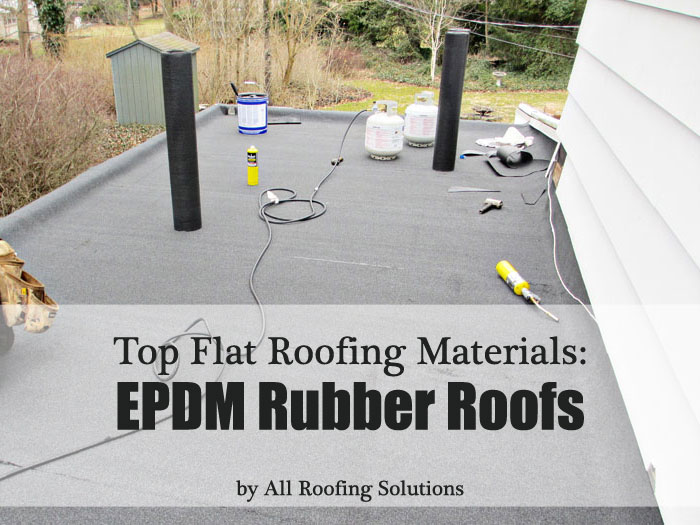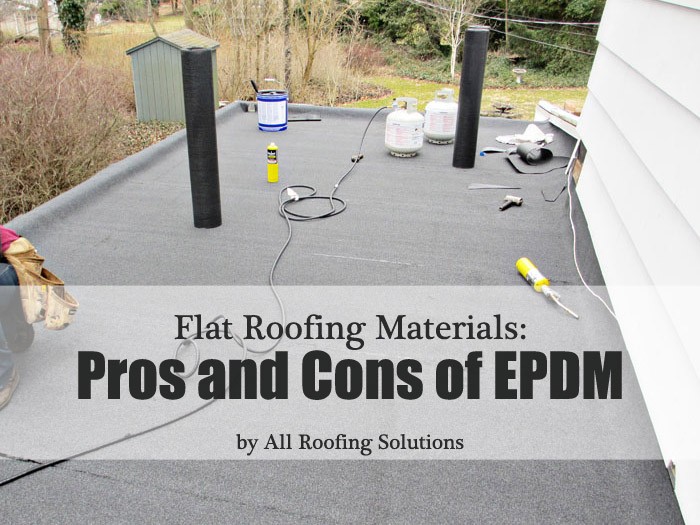EPDM, short for “ethylene propylene diene monomer,” has emerged as an exceptional synthetic rubber compound widely utilized in flat roofing since the 1960s. Crafted mainly from reclaimed materials such as tires, slate dust, and sawdust, EPDM rubber roofs offer unmatched durability and eco-friendliness.

Top Flat Roofing Materials: EPDM Rubber Roofs
Roofing is where EPDM truly shines, presenting an economical choice with exceptional performance attributes. With a design that doesn’t rely on gravity like traditional asphalt shingles, EPDM rubber roofing is particularly suited for flat roofs and those with low slopes.
Commercial roofing, in particular, finds EPDM as the premier flat roofing solution.
Advantages of EPDM Rubber Roofs
At the heart of EPDM’s merits lies its environmentally conscious composition, featuring recycled and reclaimed components. This attribute is just the tip of the iceberg. Additional benefits include:
- Affordability: EPDM rubber stands as one of the most budget-friendly roofing options available.
- Energy Efficiency: Serving as an insulating barrier, EPDM rubber thwarts heat transfer, maintaining a cooler home in summer and a warmer one in winter.
- Durability: With resistance against wind, hail, fire, and ozone damage, EPDM roofs boast a lifespan of 25 to 30 years.
- Minimal Maintenance: Not only is EPDM rubber low maintenance, but repairs are also straightforward and cost-effective.
- Lightweight Design: In contrast to alternatives, EPDM rubber roofing’s lightweight nature places minimal stress on your roof structure.
EPDM Rubber Roofs Installation Tips and Key Considerations
Installing EPDM rubber roofs offers a cost-effective and durable solution for flat roofs. However, EPDM rubber roofing installation demands meticulous preparation, careful execution, and a keen eye for potential challenges.
Whether you’re a seasoned DIY enthusiast or considering professional installation, understanding the process and potential challenges is crucial.
Surface Preparation and Adhesive Application
A solid foundation sets the stage for a successful EPDM rubber roof installation. Before applying the EPDM membrane, ensure the roof deck is meticulously cleaned, smooth, and free from debris. Any irregularities or contaminants can compromise adhesion and lead to leaks. When applying adhesive, use the appropriate type and follow the manufacturer’s instructions meticulously. Applying the adhesive evenly across the surface ensures a secure bond between the EPDM membrane and the roof deck.
Seaming and Flashing Integrity
For larger roofs, seaming EPDM membranes might be necessary. Proper seam alignment and integrity are vital to prevent leaks. Carefully overlap the EPDM sections and ensure a tight, secure seam using manufacturer-recommended techniques. Additionally, around roof penetrations like vents and chimneys, meticulous flashing installation is essential. Properly fastened and sealed flashings prevent water infiltration and ensure the long-term integrity of the roofing system.
Protecting the EPDM Membrane
Throughout the installation, safeguarding the EPDM membrane from damage is paramount. Avoid walking directly on the EPDM surface, as sharp objects or heavy tools can puncture or harm it. Implement protective measures to ensure the membrane remains intact during the installation process.
Proper Drainage and Temperature Considerations
Design your EPDM installation with proper drainage in mind. Flat roofs should have adequate slope to prevent ponding water, which can accelerate wear and lead to leaks. Additionally, factor in temperature considerations. EPDM adhesives and membranes can react differently based on temperature. Installing within the recommended temperature range ensures optimal adhesion and performance.
Professional Installation and Regular Inspections
While EPDM roofing installation might seem straightforward, enlisting the expertise of professional roofing contractors is advisable. Professionals have the experience to navigate potential challenges and ensure a proper installation. Moreover, regular post-installation inspections are essential. Timely maintenance and addressing minor issues can prevent major repairs down the line, extending the lifespan of your EPDM roofing system.

Are You Considering EPDM Rubber Roof For Your Property?
If you’re looking for a contractor with flat roofing installation expertise, consider All Roofing Solutions, a family-owned & operated Delaware roofing contractor with over 25 years of experience.
In business since 1998, we provide roof, gutter, siding & window installation, and repair services to residential & commercial customers taking great pride in what we do. We proudly serve homeowners throughout Delaware and southeastern Pennsylvania, and look forward to discussing your low-slope roofing repair project!
Call 302-725-ROOF (7663) in Delaware or 610-551-ROOF (7663) in Pennsylvania for a free estimate!
Why Choose All Roofing Solutions
 Family-owned and operated contractor
Family-owned and operated contractor- Fully licensed and insured for your protection
- Over 25 years of experience with roofing & siding installation and repair
- A+ rated BBB member
- Complimentary Extended Material warranty
- 30-year workmanship guarantee on full roof replacements
- Lien Waiver to protect the homeowners from material liens
- Own crew—no subcontractors!
- Full-service roofer handling all types of residential and commercial roofing, windows & siding projects.
- Most re-roofing projects are completed in one day.
- Because we are efficient we are able to offer very competitive prices compared to large contractors with bigger overhead.
- Each roofing/siding project includes a meticulously performed, post-roofing inspection. We want to make sure that your roof replacement is done correctly and that it meets your complete satisfaction.
- The company owner supervises all projects to ensure high-quality workmanship.
- Customer Satisfaction Guaranteed!











